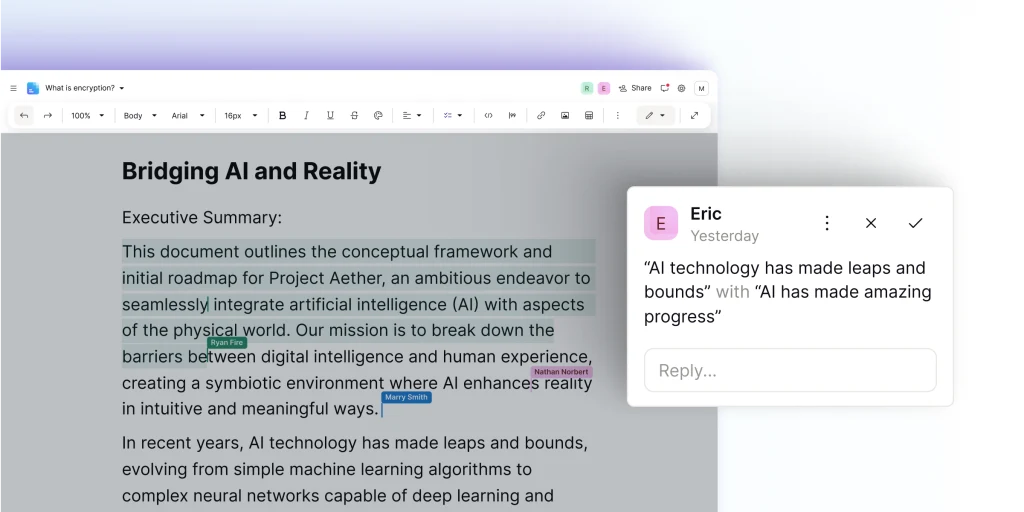Piece by piece, Proton is building an alternative to Google Workspace with a more of a focus on privacy.
The latest addition is a document editor with end-to-end encryption. Officially dubbed “Docs in Proton Drive,” the new service looks a lot like Google Docs and supports real-time collaborative editing. It’s free to use with up to 5 GB of storage.
The document editor one of many recent Proton launches aimed at making its productivity suite more competitive with Google’s. Last month, the company added automatic photo and video backups to Proton Drive’s iOS app—the same feature arrived on Android in December—signaling an interest in building a proper Google Photos alternative. Since the start of last year, Proton has also launched a password manager, rebuilt its mobile email and calendar apps, overhauled Proton Drive’s file sharing features, and added desktop apps for Proton Mail.
Google’s Workspace suite still leads in many areas—for one thing, Proton isn’t handling spreadsheets yet—but as Proton closes the gap on major features, it could be a compelling alternative especially as Google pushes more users onto paid storage plans. If you’re going to subscribe to a productivity suite, you should at least consider one that puts privacy first.
What’s in Proton’s document editor (and what isn’t)
Proton declined to make Docs in Proton Drive available for testing ahead of the public launch, but from a brief demo it looks like pretty standard for online document creation.
The top toolbar has all the requisite formatting options such as fonts, headings, and bullet points. The editor allows for inline images and supports Markdown formatting as you type. You can either create documents inside Proton Drive’s website—though mobile document creation isn’t supported yet—or import DOCX files from Word. Exports to DOCX, PDF, plain text, and Markdown are also supported.

On the sharing front, Proton’s document editor has a menu for adding collaborators with view-only or edit privileges. Invites arrive via email, and collaborators will need a Proton account, as Proton Drive doesn’t support link-based sharing or public documents. Collaborators can highlight text to comment, but suggested changes aren’t yet supported. Although Proton re-encrypts documents with every keystroke, syncing looked quick in a demo, with shared document edits taking about a second to reflect across two separate accounts.
As for privacy, Proton’s press release makes a big to-do of “never harvesting user data for any purpose.” There’s comfort in seeing an up-front commitment like that, though Google also says it doesn’t train its Document AI models on users’ private content and doesn’t use that content for advertising purposes. (Proton, by contrast, has no generative AI features to speak of.)

Proton’s end-to-end encryption does provide some assurance that the company can’t just change policies on a whim. But it’s also about fending off external threats, such as government snooping or security breaches. Even if Proton’s systems were hacked, for instance, the attacker wouldn’t have access to your documents.
Proton says more parity with Google Docs is on its roadmap. It plans to offer public document links, Notion-like interlinked documents, @ mentions, and it’s looking into direct imports from Google Drive.
As of now, Proton isn’t gating any of its document features behind a paywall, so the only limitation is storage. For users who exceed Proton Drive’s free limit of 5 GB, Proton charges 6 Euros per month or 48 Euros per year for 200 GB of storage, and 13 Euros per month or $120 Euros per year for a 500 GB plan, which also includes access to Proton’s email, calendar, VPN, and password manager.
More to come
Proton is hardly the first to offer end-to-end encrypted document editing. Its new offering draws on the work of Standard Notes, which Proton acquired earlier this year but remains available as a standalone service.
There was also Skiff, which launched in 2021 as a more private Google Docs alternative and eventually expanded to email. It’s shutting down this summer after being acquired by Notion, which doesn’t share the same privacy focus.
Proton seems to be on more stable footing. The company, which launched 10 years ago through a crowdfunding campaign, has never taken on venture capital investment and is in the process of restructuring itself as a non-profit. While its free offerings are limited, it boasts of having never raised prices on its paid plans, and it even reduced the price of its password manager subscription in January.
As Google and its fellow tech giants go all-in on generative AI, Proton has a shot to catch up on the meat-and-potatoes of document editing, photo management, file storage, and email. If it can close the feature gap while making stronger assurances about privacy and security, its own subscription offerings will be even easier to justify.
Melden Sie sich an, um einen Kommentar hinzuzufügen
Andere Beiträge in dieser Gruppe


For years, the creator economy has become increasingly accepted as the future of media. These days, makeup tutorials on TikTok could have the same impact for a brand as a multi-million dollar mark

For more than two decades, users have turned to search engines like Google, typed in a query, and received a familiar list of 10 blue links—the gateway to the wider web. Ranking high on that list,

The sky is about to get a lot clearer.
NASA’s latest infrared space telescope, SPHEREx—short for Spectro-Photometer for the Histo

The notion of authenticity in the movies has moved a step beyond the merely realistic. More and more, expensive and time-consuming fixes to minor issues of screen realism have become the work of s

Many things are considered distinctly millennial: a man bun, avocado toast, axe-throwing bars. Now you can apparently add millennial burger joints to that list.
On February 11, TikToker

OpenAI released a new base model on Thursday called GPT-4.5, which the company said is its best and smartest model for chat yet. It’s no
